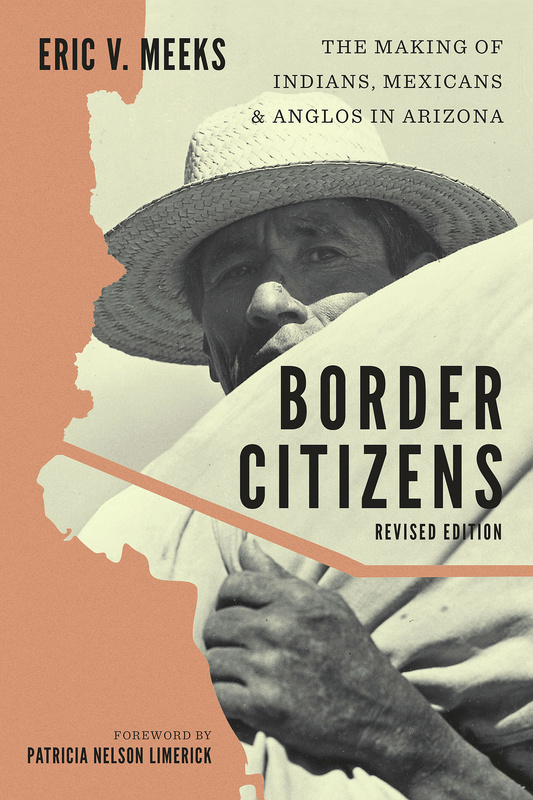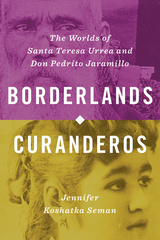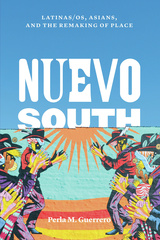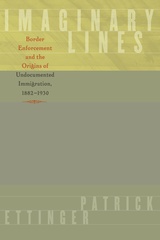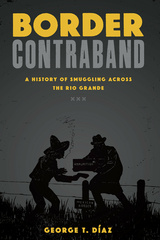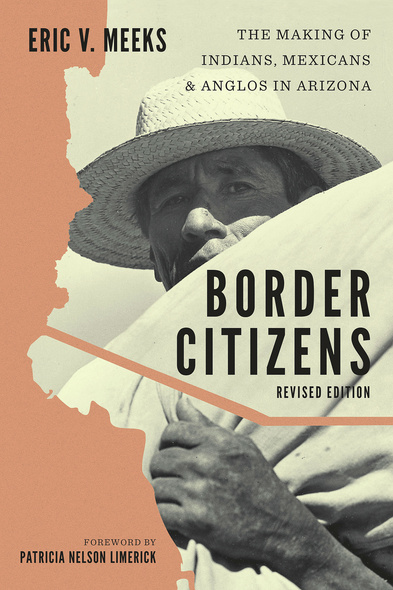
Border Citizens
The Making of Indians, Mexicans, and Anglos in Arizona
In Border Citizens, historian Eric V. Meeks explores how the racial classification and identities of the diverse indigenous, mestizo, and Euro-American residents of Arizona’s borderlands evolved as the region was politically and economically incorporated into the United States. First published in 2007, the book examines the complex relationship between racial subordination and resistance over the course of a century. On the one hand, Meeks links the construction of multiple racial categories to the process of nation-state building and capitalist integration. On the other, he explores how the region’s diverse communities altered the blueprint drawn up by government officials and members of the Anglo majority for their assimilation or exclusion while redefining citizenship and national belonging.
The revised edition of this highly praised and influential study features dozens of new images, an introductory essay by historian Patricia Nelson Limerick, and a chapter-length afterword by the author. In his afterword, Meeks details and contextualizes Arizona’s aggressive response to undocumented immigration and ethnic studies in the decade after Border Citizens was first published, demonstrating that the broad-based movement against these measures had ramifications well beyond Arizona. He also revisits the Yaqui and Tohono O’odham nations on both sides of the Sonora-Arizona border, focusing on their efforts to retain, extend, and enrich their connections to one another in the face of increasingly stringent border enforcement.
There is much to applaud in Eric V. Meeks’s Border Citizens, a sweeping account of shifting racial hierarchies and resistance in Arizona. . . . Meeks compellingly argues that racial identities in Arizona transformed from being relatively fluid in the early twentieth century to increasingly inflexible and static. The book is similarly successful at depicting resistance and resistant adaptation by Native and ethnic Mexican peoples. . . . The book is a most welcome addition and deserves wide readership among American historians as well as ethnic studies specialists.
Border Citizens serves as a model for future borderlands scholarship. . . . This text will serve as a doorway for students in courses on the West, Chicano/a history, and Native American history to engage each other's respective themes by looking at the way they affect, relate, and respond to other groups.
Border Citizens is an exceptional work. . . . While making a significant contribution to the historiography of Arizona and the Southwest, this book will appeal to anyone interested in Ethnic Studies, Native American Studies, Mexican American Studies, and Border Studies.
Meeks has produced perhaps the definitive account of Southern Arizona's economic and political development while making a strong case for the absolute centrality of race in determining who benefited from these processes.
[Meeks] uses an impressive array of sources and skillfully covers a wide range of issues within eight tightly woven chapters. He is most adept not only in describing Anglo stereotypes of Mexican Americans and Native Americans but also in carefully conveying ethnic Mexican and indigenous viewpoints. . . . [Border Citizens] broadens the historically narrow black-and-white lens scholars have previously utilized to examine the condition of race relations and social inequity.
This impressive and thoroughly researched study provides a timely intervention, probing the history of the Arizona/Sonora borderlands and the interconnection between peoples and cultures of the region. Significantly, it reveals how changing conceptions of citizenship and race were central to the formation of the state and offers insight into why they continue to matter in the present.
By not giving primacy to any ethnic/racial group and by utilizing the scholarship of Native American, Borderlands, Chicana/o, labor, and race studies, Meeks reveals how complex cultural citizenship and nation building have been in Arizona’s past, and from this remarkable work we can only surmise that it will continue to be so in the future.
- List of Illustrations
- Acknowledgments
- Foreword by Patricia Nelson Limerick
- Introduction
- 1. Desert Empire
- 2. From Noble Savage to Second-Class Citizen
- 3. Crossing Borders
- 4. Defining the White Citizen-Worker
- 5. The Indian New Deal and the Politics of the Tribe
- 6. Shadows in the Sun Belt
- 7. The Chicano Movement and Cultural Citizenship
- 8. Villages, Tribes, and Nations
- Conclusion. Borders Old and New
- Afterword: A Twenty-First-Century Borderland
- Notes
- Selected Bibliography
- Index

